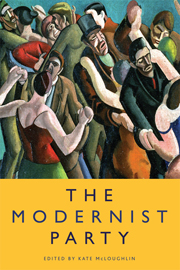Book contents
- Frontmatter
- Contents
- A Note of Thanks
- The Guest List
- Introduction: A Welcome from the Host
- 1 ‘The dinner was indeed quiet’: Domestic Parties in the Work of Joseph Conrad
- 2 Prufrock, Party-Goer: Tongue-Tied at Tea
- 3 Party Joyce: From the ‘Dead’ to When We ‘Wake’
- 4 ‘Looking at the party with you’: Pivotal Moments in Katherine Mansfield's Party Stories
- 5 Virginia Woolf's Idea of a Party
- 6 Proustian Peristalsis: Parties Before, During and After
- 7 ‘Ezra through the open door’: The Parties of Natalie Barney, Adrienne Monnier and Sylvia Beach as Lesbian Modernist Cultural Production
- 8 ‘Indeed everybody did come’: Parties, Publicity and Intimacy in Gertrude Stein's Plays
- 9 The Interracial Party of Modernist Primitivism and the Black ‘After-Party’
- 10 The Party In Extremis in D. H. Lawrence's Women in Love
- 11 Bohemian Retrospects: Ford Madox Ford, Post-War Memory and the Cabaret Theatre Club
- 12 ‘Pleasure too often repeated’: Aldous Huxley's Modernity
- Index
5 - Virginia Woolf's Idea of a Party
Published online by Cambridge University Press: 05 April 2014
- Frontmatter
- Contents
- A Note of Thanks
- The Guest List
- Introduction: A Welcome from the Host
- 1 ‘The dinner was indeed quiet’: Domestic Parties in the Work of Joseph Conrad
- 2 Prufrock, Party-Goer: Tongue-Tied at Tea
- 3 Party Joyce: From the ‘Dead’ to When We ‘Wake’
- 4 ‘Looking at the party with you’: Pivotal Moments in Katherine Mansfield's Party Stories
- 5 Virginia Woolf's Idea of a Party
- 6 Proustian Peristalsis: Parties Before, During and After
- 7 ‘Ezra through the open door’: The Parties of Natalie Barney, Adrienne Monnier and Sylvia Beach as Lesbian Modernist Cultural Production
- 8 ‘Indeed everybody did come’: Parties, Publicity and Intimacy in Gertrude Stein's Plays
- 9 The Interracial Party of Modernist Primitivism and the Black ‘After-Party’
- 10 The Party In Extremis in D. H. Lawrence's Women in Love
- 11 Bohemian Retrospects: Ford Madox Ford, Post-War Memory and the Cabaret Theatre Club
- 12 ‘Pleasure too often repeated’: Aldous Huxley's Modernity
- Index
Summary
The rhythm of Virginia Woolf's daily existence in early adulthood was largely dictated by the social obligations of a young English woman of her class, a round of activities including regular attendance at, and hosting of, a variety of different parties. Lunch- and tea-parties she often found simply dull; evening-parties, however, were much more difficult for both Woolf and her sister Vanessa. It was not only that the young women frequently felt awkward and out of place at such events (in a diary entry for 15 July 1903, Virginia claims that she and Vanessa frequently spoke to no-one for an entire evening). Their chaperoning by their half-brother George, and his proprietorial attitude towards them (inspecting and criticising their choice of clothes, berating them for perceived failures to behave appropriately), made the whole experience of party-going fraught with potential distress – and, ultimately, danger. Woolf's memoir ‘22 Hyde Park Gate’ is largely taken up with the description of her first evening-party escorted by George; not only did she return home weary and disappointed, but once she had retired to bed, George entered her room, ‘flung himself on my bed, and took me in his arms’ – he was, she records, both her and Vanessa's ‘lover’. ‘Old Bloomsbury’ picks up where ‘22 Hyde Park Gate’ leaves off, and here there is a significant slippage in narrative tense, for while Woolf begins by recalling the specific party described in the previous piece, she then states that ‘There would be a tap at the door; the light would be turned out and George would fling himself on my bed, cuddling and kissing and otherwise embracing me.’
- Type
- Chapter
- Information
- The Modernist Party , pp. 95 - 111Publisher: Edinburgh University PressPrint publication year: 2013

